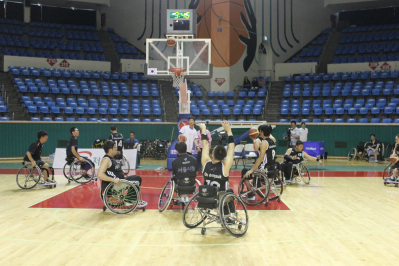
Nine years after its establishment, WheeBA members work tirelessly to improve the sports environment for wheelchair basketball players. Every month, they help manage the games held by the Korea Wheelchair Basketball Federation (KWBF).
“During the three to five days of a wheelchair basketball game, we carry sports equipment and wheelchair components, distribute food for the players, guide spectators and clean the court,” said Kim Min-sang (Kyonggi University, 4), the representative of WheeBA. “Managing the game with just eight members is extremely difficult. However, seeing the effort that the players make despite their physical challenges keeps us working as volunteers.”
Members of WheeBA also converse with the players between matches. The members remarked that the attitude of wheelchair basketball players surprised them.
“We had previously thought that the players would be somewhat depressed because of their disabilities,” Kim said. “To the contrary, they were more cheerful and active than us and always had smiles on their faces. They are also independent and never let us push their wheelchair for them. Most of the athletes are in their 20s and 30s like us but are much more mature. ”
In addition to volunteering at matches, WheeBA publicizes wheelchair basketball through diverse methods. The club has posted schedules of wheelchair basketball matches on its official Facebook page and has held interviews with various media sources. It had also opened wheelchair basketball classes for nondisabled elementary and middle school students. Members of WheeBA explained that they hold these campaigns not only to raise awareness of wheelchair basketball but also to break the prejudice against the disabled.
“Before watching a wheelchair basketball match, I had thought that the game would be slow and boring,” Kim said. “Nevertheless, after watching, I discovered that these games can be as lively as the traditional counterpart. From then on, I have worked to break misconceptions about disabled people’s abilities in general.”
WheeBA’s continuous efforts to promote wheelchair basketball and help at the games gained recognition of the KWBF, which led to financial support from the association. Nevertheless, the members say that difficulties still persist.
“Wheelchair basketball lacks attention and funding,” said Park Hyo-jung (Yongin University, 3), a member of WheeBA. “Therefore, we had to find sponsors for KWBF this year. Because we were busy with our studies and live far apart from each other, writing a sponsorship proposal took a lot of time and the proposal was not so well-written. We had no choice but to contact companies with our incomplete proposal. Fortunately, though, several companies took our offer.”
The members revealed, however, that the experience was exhausting but invaluable.
“We felt proud to hear that the proposal that we had written by ourselves would be used to improve the sports environment of wheelchair basketball players,” Park said.
WheeBA currently plans to expand the scope of its activities. Its plans are under discussion in its monthly meetings.
“We are conceptualizing a video and are planning to participate in sports fairs to raise awareness of wheelchair basketball,” Kim said.
Members of WheeBA revealed that watching the athletes compete makes them reflect on their lives.
“Watching disabled people struggling to play the sport they love made me ashamed of myself,” Kim said. “It made me wonder about the effort that I make in my everyday life as a non-disabled person. I learned that I should work harder as the representative of WheeBA.”
WheeBA members expressed that they hope to eliminate people’s prejudice toward the disabled. They stressed that disability simply means that a person is physically or mentally uncomfortable.
“We hope that disabled people will not be viewed differently from others,” the members said. “The disabled can be livelier than the non-disabled and their amount of effort is unimaginable. Therefore, people should never look down on the disabled but instead treat them as equal members of society.”
Huh Ryun-jung
ryunhuh@ewhain.net

